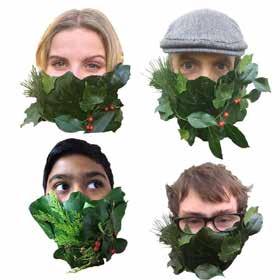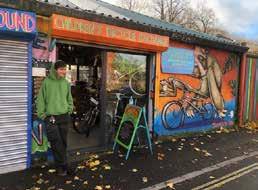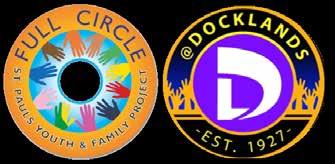
4 minute read
The Age of technology
from issue 17
From a warm climate where he is currently based it was a pleasure to catch up with my long time friend and amazing person who has set the pace in his profession as someone who has influenced the art of African dance and drumming in Bristol, nationally and internationally. Norman Stephenson or Rubba as most people know him by, has long influenced how people from all backgrounds, cultures and races can enjoy the art of the continent when along with Ekome Dance Company, the first of its kind set up in the 1976 here in Bristol, African dance came to peoples’ attention with founder and friend Barry Anderson and his family. Stephen Blagrove (Blaggy) whohas grown up as a drummer alongside Rubba and experienced the same journey, is now also one of the most experienced master drummers in the UK. They sculpted art of African dance as well as discovering over decades, the beauty and power in art of African dance which today, has helped the cross culture revolution to thrive and grow. Rubba’s legacy has far outreached his proficient ability to spread peace and love through arts, culture and to people over decades of teaching traditional dance. For someone who danced at funerals, on the streets and at his grandfathers funeral back home in Jamaica, who was homeless on the streets at one time in the early 70’s, Rubba’s passion for African dance started with traditional dance from the Carribean island’s, The Bristol West Indian Dance Company which was set up in the 1970’s when Inkwork’s ( renamed The Kuumba Centre) was a hotbed of cultural initiatives. People who meet him instantly will recognise the man who passionately educates through school programs as an independent artist for the St. Pauls Carnival and, as a director of DMAC a move he made 13 years ago with his partner Kirby and his independent company Afidance. Rubba worked at Hamilton House in Stokes Croft for 12 years from it’s origins as Co-Exist before leaving in August 2020. I took a while to chat to Rubba as he relaxes in the sun in his home country of Jamaica.
Q: Where are you now, At this moment professionally since Covid-19 broke ?
Advertisement
A: Well, with DMAC we are looking for a new space and new facilitators to re group to be quite honest. We had no funding although, Bristol City Council did help a bit to create the space with a specialised flooring we put down ( which sadly, I had to leave ) but, we covered all forms of traditional dance through the years which was unusual for Bristol back then but, the pandemic has affected everything for now.
Q: How has the pandemic affected you professionally?
A: Everything is broken down currently because of the pandemic. With Afidance and DMAC, the current uprising on the planet actually, has got more people from other cultures interested in African dance and has given us a new platform for coming back stronger. So it’s a time to re group, re organise and come back. I am in Jamaica at the moment and seeing the interest here in the Carribean that is surfacing in more people wanting to learn more of their African heritage through dance than ever before, it’s beautiful to see. More of our young black youth are interested, thats great. So, the plan would be to divide my time between here and the UK teaching and facilitating groups and workshops. UK is my base but Jamaica, I could easily spend more time here.
Q: When you began dancing …years ago, what were you influenced by back then ?
A: It was my destiny. Here in Jamaica, dancing on the streets, at school, my grandads funeral in particular, dance always held my heart. It’s always been my passion. Music, rhythm, it uplifts you.
Q: How important do you think it is for cross cultures to integrate into learning about others cultures through art?
A: It is very important. We learn through each other but I would like to see more of our own people becoming more autonomous . We have to love our own power . I have danced up and down the country for decades. A lot of people love African dance. The rhythm, the way it makes you feel. My vision is to: keep on dancing ,teaching and to be in a position to provide opportunities for others when in retirement.
Q: Education - What inspires you to work with children in your schools programme?
A: To teach children about the history of Africa through dance is a joy. I would like to see charitable organisations like The Arts Council provide more funding for African education for all children . Art’s programs should be made more available. Creativity breeds positivity. It is good for the mind, body and soul.
Q: Where do you go from here and What is the future for DMAC.?
A: Hamilton House offered us an unworkable package which, I declined to accept. Leaving has given us time to think about where we can re house. I am frustrated that going into schools children are not given enough time to learn authentic Carribean African influenced dance. The culture needs to stay alive . My vision is to keep dancing, teaching others .










